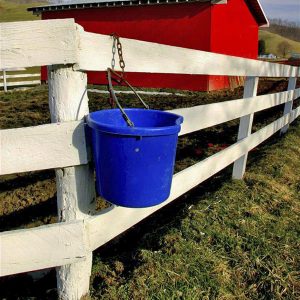
Five Easy Steps to Set Up a Good Feeding Program
In a few easy steps you can set up a good feeding program:
1. Determine how much your horse weighs. Ask your vet to help or get a weight tape at your tack store. Monitor their weight monthly.
2. Decide if you are happy with your horse’s condition (weight). You can use this handy condition scoring system to help. Knowing your horse’s condition score will help you decide if they need to eat more, or be offered less feed to remain healthy. If they are too fat or too skinny, decide on a target weight and feed the right amount to attain and maintain that weight.
3. Choose a good-quality fiber and feed it by weight, not volume. Feed 1.5% to 2% of your horse’s target weight in hay and/or pasture per day. Don’t go below 1%. If your horse maintains condition on an all-fiber diet, then add a vitamin and mineral supplement.
4. If you need additional energy to fuel performance or maintain weight, choose a good-quality fortified concentrate (sweet feed or pellet) and feed it according to the manufacturer’s recommendations. If you need help picking the correct feed, contact the feed manufacturer’s nutritionist by phone or online.
5. If your horse has problems—too fat, too skinny, poor hoof quality, lameness issues—then contact your vet to discuss proper diagnosis and a treatment plan that may include additional supplements.
Feeding horses can be confusing but there are some easy rules you can follow.
Hay and pasture are referred to as fiber. Fiber is the most important part of your horse’s diet. Horses need to eat at least 1.5% to 2% of their body weight in fiber per day. For example, a 1,000-lb horse should eat 15 to 20 lbs of hay per day. For most horses a good-quality grass hay is the best choice.
It is best to know how many pounds of hay your horse is eating . A typical flake of hay weighs 2 to 3 lbs. The best thing to do is to weigh a few flakes of your hay so you know how much it weighs on average. For example, if your horse weighs 1,000 lbs and your flakes weigh about 3 pounds, then you would have to feed at least 5 to 7 flakes per day. If your flakes are lighter, you will have to feed more. In the winter, horses need more hay to stay warm when it is cold out.
If your horse is turned out on lush pasture, then that will count as fiber and they may not need as much hay. A good rule of thumb is that for every hour a horse grazes on lush pasture they eat the equivalent of 1 lb of dry hay. For example, if your horse is turned out on lush pasture for 6 hours each day, they are eating about the equivalent of 6 lbs of hay. If the pasture is heavily grazed or has a lot of weeds then the amount of nutrition they get from the pasture is greatly decreased. In the winter when the pasture dies off, the horse will need more hay.
If a horse can maintain a good weight on hay and pasture alone, then you should add a vitamin and mineral pellet to their diet to ensure that they get plenty of vitamins and minerals. It is similar to the multivitamin people take every day. I recommend Micro-Phase.
If your horse is still a bit skinny on hay and pasture alone, then you need to feed the recommended amount of a good-quality, fortified commercial concentrate. These will come in the form of sweet feed or pellets. If you feed one at the recommended amount then your horse will get all the energy, vitamins, minerals, and protein she needs. There are lots of good quality commercial feeds available. Take a trip to your local tack store or horse feed supplier and talk to them about your horse. You can also contact the feed manufacturer directly and they will have a nutritionist call you. They will take your information and suggest the right feed at the right amount for your horse.
Supplements are used to “supplement” your horse’s diet when they don’t get all the nutrients they need from fiber and concentrates. Some horses need additional energy to fuel work or maintain condition (the proper weight). Those horses would benefit from a fat supplement such as Equi-Jewel. Horses that don’t graze on grass as least 17 hours per day need additional vitamin E in their diet to protect their nerves and muscles. A supplement like Elevate is recommended. Some horses do best on a joint supplement to keep them sound, such as Joint Armor. The best way to pick the right supplements for your horse is to talk to your veterinarian or contact us at Kentucky Performance Products. We will be happy to review your feeding program and answer your questions.
To learn more about specific feed and supplement-related topics, visit the Kentucky Performance Products website and look through the articles in the Tips and Topics section.


